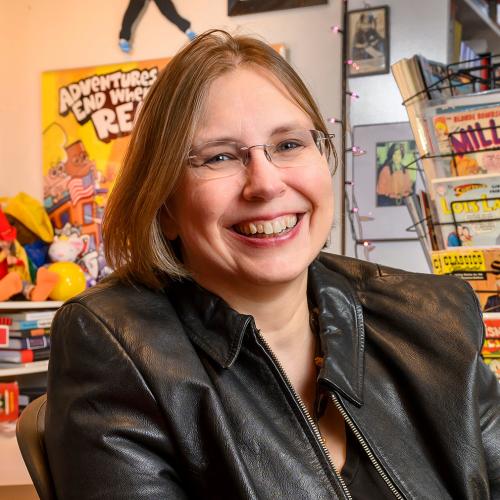Associate Professor Carol Tilley will join thousands of her fellow comic book fans in San Diego July 9-12 for Comic-Con International, one of the largest comics and entertainment events in the world. Tilley will share her expertise in comics and comics history through her participation in the following panel discussions:
"Lost (and Found) Comics Studies of the Past," with authors Brad Ricca and Sean Howe.
Over the past year, a number of surprising (and stunning) lost pieces of comics scholarship have come to light. In particular, we will discuss the 1942 comics thesis of "Superman" artist Paul Cassidy, newly discovered by Sean Howe. Cassidy’s thesis has been a revelation, but scholar Carol Tilley has begun unearthing additional comics theses from the 1930s and 1940s that expand our understanding of comics production practices, readership trends, and practical applications. What was the first comics scholarship? What can we learn from it? What do we do with it? And, most provocatively, is there more out there? This panel will debate why this question strikes such a nerve with scholars, fans, and readers.
"Comic Book Readership Archives," with John Walsh of Indiana University-Bloomington.
The Comic Book Readership Archive project, or CoBRA, is building a digital archive—of primary source material and related data sets—to document American comic book readership and fandom. CoBRA will include content from such sources as: fan mail, fan club publications, contests, fanzines, and programs and attendee records from comic book conventions and similar events.
Comics scholarship is an established area of academic research; however, previous studies have not fully considered the vast documentary record of comic book readership that will be compiled and analyzed in the CoBRA project. CoBRA will address this gap in comics scholarship by providing access to a large and growing archive for the study of comic book readership.
“CBLDF Presents: Diversity and Censorship.”
When the American Library Association released their latest annual list of the most challenged books, a disturbing trend was noted: books that increased the diversity of what is available to readers were more likely to be challenged. What is it about diversity that seems to encourage censors? Join the Comic Book Legal Defense Fund (CBLDF) and library and education professionals Candice Mack (president-elect, Young Adult Library Services Association), Erwin Magbanua (San Diego Public Library), Carla Riemer (librarian, Claremont Middle School, Oakland, California), and Carol Tilley (associate professor, University of Illinois) for a discussion of why diverse books are challenged and how we can defend them.
“Spotlight on Craig Yoe.”
Yo, Yoe! Comic-Con special guest Craig "The Indiana Jones of Comics Historians" Yoe is celebrating fifty years of writing and producing fanzines and books about the history of comic books and five years of Yoe Books. He will be interviewed by luminaries Ted Adams (president/CEO IDW), Kelley Jones ("Batman"), Jon Cooke (comics creator), Carol Tilley (Wertham debunker), David Scroggy (Dark Horse), and Dean Yeagle ("Mandy").
Later this summer Tilley will speak at the Comic Book Mania Convention, which will be held at the Gail Borden Public Library in Elgin, Illinois, on July 18. She will deliver a talk titled, “The Secret History of Comics Readers.”
In November 1953, Ople Noble sent a letter to forensic psychiatrist Fredric Wertham. Noble, who was secretary of her eighth grade class in Bisbee, Arizona, and her classmates had read and discussed Wertham’s article in Ladies’ Home Journal, “What Parents Don’t Know about Comic Books.” She wrote to share her and her classmates’ insights on juvenile delinquency and comics with the psychiatrist, as they disagreed with many of his conclusions. Encouraged by Wertham’s reply, which was accompanied by a box of chocolates from Macy’s Department Store, Noble wrote at least two more letters to Wertham, one of which outlined the results of a class discussion on the comic character Green Arrow.
In this talk, Tilley will share more about Ople, as well as young fanzine creators, letter writers, amateur cartoonists, and more, who read, wrote, and played with comics during the mid-20th century. Don’t miss these secret and seldom-told stories of some of the kids who helped make comics the most important print media of the 20th century and remind us why comics matter.
She also spoke on “The Secret History of Comics Readers” at a pre-conference workshop held in conjunction with the Kids Read Comics event at the University of Michigan in June.
Tilley is a nationally known expert in comics readership and history and has worked with many of the comic-related archives and research collections in the U.S. Her research has focused on comics/youth engagement—historically and today—and the many factors that have influenced engagement, such as the role of librarians and educators. She has looked closely at the attitudes and practices of librarians, which may have impacted comics readership and certainly influenced access.
Tilley’s research has been published in several academic journals, including the Journal of the American Society for Information Science and Technology (JASIST), Information & Culture: A Journal of History, and Children’s Literature in Education. Her research on anti-comics advocate Fredric Wertham has been featured in The New York Times and other media outlets. At GSLIS, she teaches courses in comics reader’s advisory, media literacy, and youth services librarianship.
